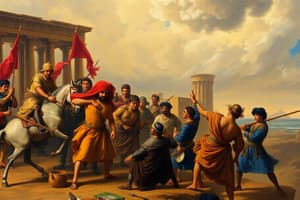Podcast
Questions and Answers
What period did the Greek city-states experience great prosperity?
What period did the Greek city-states experience great prosperity?
Between the 6th and 4th centuries BC
What was a significant outcome of the Greek victory over the Persians?
What was a significant outcome of the Greek victory over the Persians?
- Increased military conflicts
- Economic downturn
- Decline in creativity
- Wave of creativity and innovation (correct)
The Spartans organized themselves as a democracy.
The Spartans organized themselves as a democracy.
False (B)
What political system did the Athenians develop?
What political system did the Athenians develop?
Who were the two notable leaders of the Macedonians?
Who were the two notable leaders of the Macedonians?
What characterized the golden age of classical Greece?
What characterized the golden age of classical Greece?
What caused the decline of the golden age of classical Greece?
What caused the decline of the golden age of classical Greece?
In which regions did the Macedonians conquer after Greece?
In which regions did the Macedonians conquer after Greece?
¿Qué período de esplendor se vivió en las polis griegas entre los siglos VI y IV a.C.?
¿Qué período de esplendor se vivió en las polis griegas entre los siglos VI y IV a.C.?
¿Qué forma de gobierno fue creada por los atenienses?
¿Qué forma de gobierno fue creada por los atenienses?
Las polis clásicas griegas se organizaron de la misma forma para gobernarse.
Las polis clásicas griegas se organizaron de la misma forma para gobernarse.
¿Qué simboliza la cornucopia?
¿Qué simboliza la cornucopia?
¿Quiénes lideraron a los macedonios durante su conquista?
¿Quiénes lideraron a los macedonios durante su conquista?
La cornucopia se convirtió en el atributo de diversas divinidades asociadas con la cosecha y la ______.
La cornucopia se convirtió en el atributo de diversas divinidades asociadas con la cosecha y la ______.
¿Qué regiones intentaron controlar los macedonios en su expansión?
¿Qué regiones intentaron controlar los macedonios en su expansión?
Flashcards are hidden until you start studying
Study Notes
Greek City-States and Cultural Development
- The period between the 6th and 4th centuries BC marked significant prosperity for Greek city-states.
- The victory over the Persians during the Persian Wars spurred economic growth and cultural innovation.
- Advancements were observed in architecture, military organization, philosophy, mathematics, and natural sciences.
- City-states exhibited diverse governance: Spartans were governed by an aristocracy, while Athenians developed the first known democracy.
Era of Classical Greece
- Historians denote a 400-year span from Homer to Aristotle as classical Greece, a time rich in artistic and philosophical advancements.
- This period established foundational art styles and philosophical concepts that influenced future Western culture.
- The golden age began to decline in the late 4th century BC due to internal power struggles among Athens, Sparta, and Thebes.
Macedonian Conquest
- Power struggles among Greek city-states weakened the region's stability.
- The rising Macedonians capitalized on this weakness, led by Philip II and later his son, Alexander the Great.
- The Macedonian empire expanded its influence, conquering Greece and extending its reach into North Africa, the Middle East, and India.
Classical Greece to Macedonian Empire
- Between the 6th and 4th centuries BCE, Greek city-states (polis) experienced a period of economic prosperity and cultural development.
- The Greek victory against Persian invasions during the Persian Wars marked the beginning of significant cultural and creative advancements.
- Innovations spanned architecture, military organization, philosophy, mathematics, and natural sciences.
- Political structures varied among city-states; Sparta was governed by an aristocracy, while Athens established a form of democracy allowing citizen participation.
- The era from Homer to Aristotle was crucial, producing foundational ideas and artistic styles influencing future cultures.
- Major city-states contributing to this cultural flourishing included Corinth, Thebes, Mileto, Sparta, and notably Athens.
- The rise of these city-states began to decline in the late 4th century BCE due to power struggles and rivalries among key polis like Athens, Sparta, and Thebes.
- This weakened state was exploited by the Macedonians, initially under King Philip II and later by his son, Alexander the Great.
- Macedonian conquests aimed to extend control into North Africa, the Near East, and distant regions of India.
- The symbol of prosperity, the cornucopia, originates from 5th century BCE Greece, representing abundance, depicted as a goat's horn filled with fruits and flowers.
- The cornucopia became associated with various deities linked to harvest and prosperity, such as Gea (Earth goddess) and Fortuna (goddess of fortune).
Studying That Suits You
Use AI to generate personalized quizzes and flashcards to suit your learning preferences.




